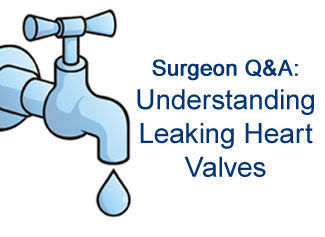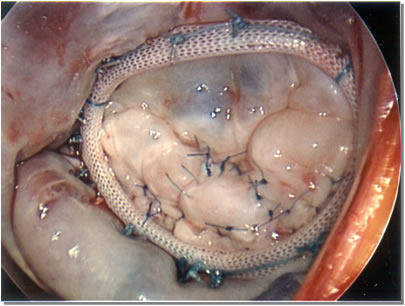Surgeon Q&A: Understanding Leaky Heart Valves with Dr. Accola
By Adam Pick on May 24, 2013
One of the most common forms of heart valve disease is regurgitation, a disorder in which blood leaks backward across the patient’s aortic, mitral, pulmonary or tricuspid valve. So you know, my inbox is often filled with questions like, “What is a leaky heart valve?” and “Are leaking valves dangerous?” and “How are leaky valves treated?”
To answer those questions, I recently met with Dr. Kevin Accola, a leading cardiac surgeon from AdventHealth Cardiovascular Institute (formerly Florida Hospital) in Orlando. The highlights of our discussion about leaking heart valves are in the educational video below. So you know, Dr. Accola has performed successful surgery on many patients in our community including Denise Ring, Misti Blue, Scott Nieman and Duane Hunt. 🙂
I hope this video helped you learn more about leaky heart valves. Thanks to Dr. Accola for taking the time to share his clinical experience and research with our patient and caregiver community. And, many thanks to Doctor Accola and the AdventHealth (formerly Florida Hospital) team for helping so many people from our website!
For the hearing impaired members of our community, please find a written transcript of this video below:
Dr. Kevin Accola: I’m a cardiovascular surgeon from Orlando, Florida. I practice at AdventHealth in Orlando. I’m the Program Director of our Valve Center of Excellence. My team has done over 9,000 cardiac procedures. 80% of my work now is valve surgery — which I do over 300 valve operations per year.
Adam Pick: Can you tell me what attracted you to cardiac surgery?
Doctor Kevin Accola: Thank you for having me here today Adam. I have been athletically inclined and interested in physiology — how the human body performs –and what more is more important than the engine of the body, or the heart. So, it’s been a real passion of mine. I really love what I do. It’s just the most incredible opportunity and privilege to be able to work on someone’s heart, get it fixed, help patients through their hospitalization and, ultimately, see patients doing what they want to do again.

Adam Pick: Can you explain what a leaking heart valve is?
Doctor Accola: The heart valve typically functions when the heart contracts it opens (particularly through the aortic valve), when it relaxes it closes. Consider the common door of your house… If the door opens normally you can walk out. But, if there’s a problem — either with the door or with the door frame — when the door closes, the door frame doesn’t close against the door. Wind, for example, is going to blow through the door. It’s the same thing within the heart, as the valve opens and closes — if structurally the valve is not normal — or the surrounding aspect of the valve is not normal — then the valve is going to leak.
Adam Pick: What causes a leaking heart valve?
Kevin Accola, MD: A valve is going to leak from a number of reasons. In the mitral valve, if the structure below the valve that supports the valve doesn’t work, the valve will leak. Consider the strings of a parachute. If any of those strings break then the parachute isn’t going to function. In the aortic valve… If the skeleton of the aortic valve becomes dilated (enlarged), or if there’s a structural problem with the valve leaflets itself (calcification), the valve won’t allow the leaflets to come back together. That condition will cause the valve to learn, also known as insufficiency or regurgitation.
Adam Pick: Can leaking heart valves be harmful to the patient?
Dr. Accola: Yes, the problem with s leaking heart valve is if there’s an abrupt rupture of the cords that support the valve (particularly in the mitral valve), then the patient can go into extreme heart failure, shortness of breath and chest pains. In the aortic valve, what happens over time — when the aortic valve or the mitral valve begins to leak — is the chambers become more dilated because blood is not going in one direction in the heart. Blood is actually backing up into the heart chamber from where it came – so, a leaking heart valve often times is a very subtle symptom. But, overtime, as the heart muscle gets weaker, that’s when more extreme symptoms occur.
Adam Pick: How can the leaky mitral valve be treated?
Dr. Kevin Accola: Mitral valve repair is the optimal way to treat a leaking mitral valve. If the leaflet is torn or if there’s excessive leaflet tissue then we remove that aspect of the valve that’s abnormal and reconstruct the particular leaflet where the abnormality was. In addition, your surgeon may want to remodel the annulus — or the doorframe of the valve — back to its normal shape using an annuloplasty ring. When a valve begins to leak — instead of being shaped like a capital D on its sides which is the normal geometry of the valve — they become more circular. So, by repairing the mitral annulus, with a support ring it recreates that normal capital D shape which allows the valve to function normally.

Mitral Valve Annuloplasty Ring
Adam Pick: So if I have a leaking aortic valve, how can patients be treated?
Kevin Accola, MD: Leaking aortic valve sometimes need to be replaced. In fact, most of the time the aortic valve needs to be replaced because there’s a structural abnormality of the aortic valve leaflet. Unfortunately, the majority of the time there’s too much destruction of the valve to the point where we have to cut out the valve and place a new valve. The patient choices are the biological valve — which you don’t have to be on a blood thinners. Or, the mechanical valve — which require anticoagulants like Coumadin. Those are options that you want to discuss with your physician or surgeon to see what’s best for you.
Adam Pick: What can patients expect once they’ve had a leaking heart valve surgically treated?
Dr. Kevin Accola: The risks of a mitral valve repair surgery is very low. Patients should have a 99.5% chance of doing just fine. If they have other co-morbid problems with their kidneys, or their lungs, or other issues that may increase the risk. But long term, if the valve can be restructured to its normal functioning capabilities the patient’s lifelong expectations should be very good. The outcomes for aortic valve surgery are just as good. Typically, we need to replace the aortic valve. So, it is often times more dependent on if we utilize a biologic valve, for a younger person, they do have a finite lifespan. The mechanical valve, of course, last forever but the patient has to be dependent on blood thinners. So, this is something that patients should always discuss with their physician to see which valve would be optimal for them.
Keep on tickin!
Adam
|
Ellen Ridsdale says on May 26th, 2013 at 11:53 am |
|
Thanks for posting this. Since I have both mitral and aortic valves leaking this was very helpful. If the aortic leak is caused by a structural abnormality most of the time, does this appear very slowly over many years. In 2011, my echo just showed a mitral leak but then a year later, the aortic valve was leaking. I was also told that the mitral leak was less in 2012 than it was in 2011, which the cardiologist attributed to my commitment to exercize, which he says caused the improvement. I can’t help but wonder why then the aortic valve began leaking. Ellen |
 |
|
Sue Stroud says on May 29th, 2013 at 4:01 pm |
|
Thanks Adam for the information about leaking valves. I wonder if anyone has had the experience I am going through now. My aortic valve was replaced 6 weeks ago with a tissue valve. The followup Echo at 4 weeks showed a heart murmur due to a paravalvular leak…. .an inner suture came untied or broke. There is a moderate leak now. (As I had the traditional open heart surgery I have not healed enough to even think about a reop… but that was not suggested). I will have an echo again in 3 months. Has anyone else dealt with this rare complication? Thanks for any information. |
 |
|
jeanne michaels says on May 29th, 2013 at 5:03 pm |
|
Mitral valve repair unsuccesful. I am 83 in excellent health otherwise, should I consider replacement? Leak is moderately severe, or just severe and I feel it is getting worse. Surgery Sept 2011, Cardiologist luke warm on another procedure. Do not want to lose ability to live independently. |
 |
|
Crystal says on June 4th, 2013 at 12:45 pm |
|
Adam, First of all THANK YOU so so so very much for all you have done putting this information out there for people to see & educate themselves on!!!! My son who is 3 years old had open heart aortic valve repair surgery (a tissue patch was put in for the narrowing) at 4 months old, he was born with aortic valve stenosis with a bicuspid aortic valve and leakage. As I just learned in your book, you had the same valve problem. He is going to have the Ross procedure in 2 weeks due the valve’s severe leaking. I read your book & I was so impressed with the amount of information. I’m so scared & worried but wanted to let you know how much your book has helped me to better understand this procedure & I again thank you Adam!!!! |
 |
|
Jennifer says on June 11th, 2013 at 9:27 pm |
|
Thank you for sharing this information. In 1981, I had open heart surgery utilizing the balloon procedure to open up my aorta valve at only age 4. In 2003, I had the Ross Procedure to fix the valve but also had a leaking mitral and tricuspid valve. Nearly 10 years post Ross, I am doing ok but get monitored yearly as I have a moderate to severe Mitral leak, moderate Aorta leak, moderate Tricuspid leak and there is stenosis with my pulmonary valve. It is possible I will need a re-op in about 5 years with the pulmonary according to my doctor but I am not having any symptoms at this time which is great news. Your information is very informative so thank you. |
 |
|
M Sutherland says on February 17th, 2014 at 9:01 pm |
|
Adam, My wife, a 58 year old and 20+ year ago recipient of a mechanical aortic valve has now been informed it has gone from moderate to severe back-leakage necessitating a replacement. Where do we look for a qualified surgeon experienced in thus surgery in or near Florda! Her original was replaced at Bethesda naval hospital! This is not an option this time around. |
 |
|
Norene says on March 24th, 2014 at 2:24 pm |
|
I have a slight leak , and is 124lbs and 74 years. Olds. |
 |












